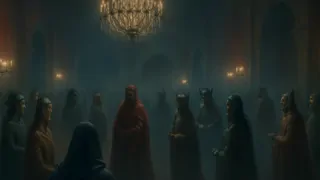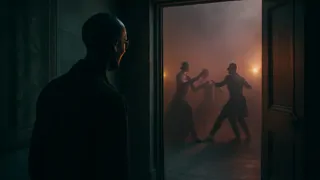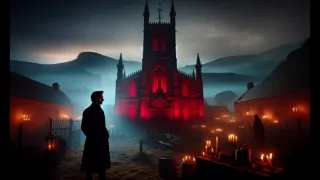Introduction
Prince Alcine perched upon the highest stone battlement of his secluded abbey, gazing out over a land ravaged by a merciless plague that had earned the ominous name Red Death. Crimson mists crept from shattered villages and damp forests, staining fields once lush with grain and casting an otherworldly glow upon desolate roads. The autumn air, crisp and chill, carried the low moan of sorrow, while distant bells tolled for the lost souls who succumbed to fever curled by every hearth. Within ancient walls painted a deep carmine hue, the prince had sealed ebony gates and barred each archway with iron locks, determined that no shadow of disease would cross his threshold. Lanterns flickered along echoing corridors, their golden light dancing upon tapestries that yearned to soften the oppressive hush. Courtiers in lavish masks whispered of lavish banquets and intoxicating music that would soothe anxious hearts, yet behind each ornate door lay the promise of dread. Tonight, seven interconnected chambers, each decorated in a single haunting hue, would come alive in defiance of death itself. Silk draperies, velvets, and polished marble set the stage for a masquerade that would mock the plague at its retreat, or so the prince believed. As torches flared in the twilight, alcoves exhaled shadows long enough to swallow whole conspiracies of fear, and Prince Alcine felt the stirring of both exhilaration and foreboding as he waited to welcome those who would dance against the encroaching night. Through narrow arrow-slit windows, the scarlet dusk bled into arched chambers, lending an unsettling life to painted allegories of triumph and demise that graced the walls. Servants in sable livery carried crystal decanters of wine as purple as bruised skin, while masked nobles practiced silent dances by candlelight, their laughter a fragile barrier against unending dread. Yet behind each gilded mask a silent prayer beat like a drum of defiance. Rumors whispered that even the mightiest fortress could not stem the tide of sinew and sorrow that the Red Death heralded in every hollow cough and every sealed cry for mercy. So Prince Alcine, robed in sable trimmed with garnet, moved through his sanctuary with a measured gait befitting a sovereign who believed that wealth and will could fend off mortality’s scythe. In the heart of the abbey, where the final chamber glowed with a hue as deep as dried blood, he prepared to supplant fear with revelry, certain that tonight’s masque would mark the plague’s retreat and seal his triumph over the scourge.
The Crimson Sanctuary
In the days that followed the onset of the Red Death, villages lay abandoned and highways were slick with crimson dew. Wax candles burnt low in every hamlet as the dying sank to loosened canvases and stone floors, surrendering their labored breath to a plague that showed no mercy. Word of the prince's crimson-hued abbey reached fearful ears, and those with enough coin or cunning who dared to hope for refuge arrived at his iron portcullis, each soul blinded by desperation and the illusion of safety. Guards clad in sable armor, their visors down, scanned the throng of ragged supplicants for signs of illness, while crimson-panted servants guided the chosen few through segmented courtyards into a world sealed off from death’s icy grasp. Flickering torchlight danced upon the polished granite floors, casting grotesque silhouettes against tapestries embroidered with scenes of conquest and salvation. Every surface gleamed with fastidious care; no stone was left unpolished, no tapestry unstraightened, as if such perfection could ward off the specter that simmered just beyond the gates. The air smelled of punishing cold and scented oils, a juxtaposition that unsettled even the hardiest veteran of war. Within these blood-toned walls, Prince Alcine believed he had built more than a fortress—he had erected a temple where merriment and might would combine to mock a plague that dared not cross floors so immaculate, corridors so precisely ordered. All around, courtiers gossiped in hushed tones, their ornate masks concealing faces drained of both color and hope, each one clutching the silver invitation to the grand masque, convinced that this single night of revelry would forever turn the tide against a disease they could not otherwise outrun. Underfoot, the mosaic floors gleamed so profoundly that guests could glimpse the tortured faces of fallen emperors woven into the patterns; even these silent sentinels seemed to recoil at the thought of the plague. On heavy oak doors, rivulets of lacquered blood dripped as though in warning, and in shadowed corners the devout muttered prayers before dispersed chapels. None spoke of mercy, for mercy belonged to the living; here, the prince had ensured that isolation would stand in for any divine intercessions.

As the great clock in the eldest tower struck the first hour of the night, a hush fell upon the assembled guests. A lone minstrel, perched at the far end of the hall, coaxed a melody from a silver-laced harp, its notes drifting like a ghostly lament through the sumptuous gloom. Columned alcoves revealed hidden tables laden with chalices of wine as red as the plague's promise and fruits lacquered in honeyed glazes. Courtiers in brocade and lace moved in a stately waltz, their masks glittering under the shards of gentle lamplight. Yet beneath the ornate masquerade, quiet words passed behind jeweled fans: rumors of color draining from the lilies in the courtyard, of clandestine coffins hastily erected in curtained rooms, of servants discovered collapsed beneath the arches. The prince watched from a dais carved from black marble, his cloak trailing like an ink stain upon polished stone. He raised a crystal cup in a toast, voice firm and unwavering, pronouncing the masque a testament to human will and defiance of death itself. Applause rang out and wine shimmered in chalices, but in Alcine's heart a verdant seed of doubt took root, growing swiftly with every measured breath and muted cough that emerged from the crowd like a hidden blade. Between the pillars, he glimpsed conjectures of shadow and rumor: a noblewoman convulsing in silence, an unseen guest vanished from the gallery, distant echoing footsteps that belonged to no recorded musician. And still the red mist pressed at the tall windows, creeping across glass panes with relentless curiosity.
As midnight approached, the candles themselves seemed to wilt, their flames bending and flickering like imprisoned souls. A strange hush overtook the throng, as though the very walls held their breath. Musicians faltered, notes lingering in the air like unwanted memories. It was then that a chilled wind rushed in through a door flung open by unseen hands, extinguishing torches in its path and sending a shiver through every guest. A murmured prayer rose from cloaks and collars, voices tenuous as drifting ash. Deep within the shadows, a tall figure emerged, cloaked entirely in flowing ruby fabric that soaked every torchbeam in burdensome scarlet. No mask concealed its visage; instead, the undulating folds of its cloak framed a skeletal hand, heavy with stained rags, beckoning with an unhurried arrogance. Guests froze mid-motion, their masks pointing uselessly to half-smiles. The orchestra fell silent, strings still vibrating with a haunted resonance. Prince Alcine's heart thundered as the figure advanced upon the dais, tracing a deliberate path through bodies that parted like red seas. His crown felt impossibly heavy, and the jeweled hilt of his dagger flashed in helpless desperation. But the figure’s approach was inevitable—an unspoken verdict cast in the language of fear. As it paused before Alcine, the prince’s mask slipped from his trembling fingers, clattering to join the host of metallic echoes that proclaimed the Red Death had come home.
Shadows Behind the Masks
As dawn’s last memory faded from the stained-glass windows, corridors suffused with auburn gloom led guests into secret chambers and intimate galleries designed for whispered confidences and clandestine alliances. Deep within these winding passages, the tapestry-covered walls absorbed muted footsteps like hungry shadows, and behind each carved door, the pressure of unseen horrors pressed with inexorable weight. In one alcove, a pair of masked attendants discovered a noblewoman’s portrait smeared in variegated stains as if fingers of slow crimson had reached through painted wood to claim her image. Elsewhere, a muffled sob escaped from behind a cedar-paneled partition, followed by a hurried scraping of sandal-leather feet. Servants, their faces concealed by ebony cloth, exchanged haunted glances when summoned to pry open locked doors, only to reveal galleries lined with empty chairs and tables covered in untouched meats—latent feasts abandoned in panic. Every whispered rumor coalesced into a chorus of disquiet, each rumor bending the spine of hope until it cracked under the weight of dread. And through it all, the Red Death drifted like a ghost with purpose, glimpsed at the periphery of vision: a hand pressed against stained glass, a crimson-shrouded silhouette around shadowed columns, a low whisper that lingered where no mouth moved. Courtiers, flush with wine beneath elaborately painted masks, traded uneasy glances, uncertain whether to flee or to dance, as if motion itself might stave off the relentless fact that the blood-red scourge had forged a path to the heart of this sanctuary. A hushed murmur of sacraments once held in broken chapels drifted through the vaulted ceilings, as if the ghosts of past penitents roamed the corridors searching for mercy they had once denied. Among the investigative murmurs, an urbane duke reported footprints in golden dust that turned to liquid scarlet nearly at the threshold, a grotesque reversal of autumn’s fallen leaves. In hushed wards, healers summoned by the prince’s edict conferred with trembling fingers before sealing doors once more, their ointment-stained hands testament to the battle they could not yet claim a victory over. Meanwhile, painted gargoyles perched high above leered down with stony disdain, as if chastising those who dared challenge mortality with silk and steel. At the turning of each arch, frescoes depicting heroic triumphs over lesser ills now felt like cruel predictions, mocking mortal hubris with every rind of dried blood on their gilded frames. Even the grand organ in the central nave, silent since the mass, seemed poised to resume a lament, its keys dusted in motes that danced like confessions in the hush that shook the pillars.

In his private chamber high above the throng, Prince Alcine stood before an ornate mirror of burnished bronze. The reflection that met his eyes was one of noble resolve etched upon pallid skin, crowned hair pinned with rubies that flickered like embers against his brow. Yet behind the carved iron mask he had chosen to wear in solidarity with his guests, his eyes flickered with fatigue and disbelief. He recalled the day the first messenger had brought word of a howling sickness spreading through the hinterlands, a plague whose namesake was born from the violent stain it left upon its victims’ veins. Once, he had believed that wealth and power could overwhelm any threat, and that the walls of his fortress would serve as an impassable bulwark. Now, as he adjusted the heavy cloak about his shoulders, he felt the weight of mortality press upon him like an accusing fist. Memories of laughter and pursuit at court—of swirling gowns at summer festivals and the gentle brush of a beloved’s hand—nipped at the edges of his mind, tormented by the roar of mortality’s verdict. The mirror seemed to warp his visage, elongating his jaw and hollowing his cheeks until he looked as though he were already a revenant. He understood, with terrible clarity, that the tracks of human vanity ended in dust and that death’s march was indifferent to rank or invitation. He recalled the gentle resonance of church bells in quieter times, their chiming a lullaby to the faithful. Now the bells tolled for the dead, each peal echoing through hollow streets deserted of hope. From his desk, still cluttered with parchments detailing troop movements and tax ledgers, he tore aside a vellum bearing news of two hundred more deserted villages. The margins were spattered in ink rings swollen with neglect, a silent testament to a kingdom unraveling even as he sought shelter within its grandest hall. A single candle guttered on a silver stand, its wick smoking in protest, and as he watched ash drift toward his boots, he felt something shift in his chest, a tremor of despair unmasked by the crown he carried. He rose to his full height, resolved to reclaim control of what sliver of existence remained in his grasp, though he knew every stride toward defiance edged him closer to the very fate he wished to deny.
Below, in the vestibule that connected all seven chambers, an almost reverent hush replaced the earlier hum of frivolity. The final door—waxed black and sealed with scarlet seals bearing the prince's crest—stood at the corridor’s far end. It was whispered that this room held relics of past triumphs, and that only the prince might enter its sanctum to claim the crown jewel of the masque: a mirror rumored to reflect not the self, but the truth of one’s own soul. Tonight, those gilded curtains parted as men-at-arms in blood-streaked tabards swung back the heavy drapes. A siphon of air that shimmered with unspeakable cold unfurled like a banner, snuffing out half a dozen lanterns before so abrupt a stillness settled that every breath felt like an intrusion. From within the chamber, a slow, deliberate creaking sounded as though a great door awakened from centuries of slumber. Then, as if summoned by some unholy rite, the door swung open to reveal a figure carved from nightmare: robed in velvet the hue of spilled rubies, with hollow eyes that gleamed with a predatory calm. Those who glimpsed it spoke later of the silence that followed—a silence so complete it swallowed heartbeats whole. The Red Death stepped forward upon the threshold, its feet leaving prints of blood that pulsed with dark pride. Murmurs fled and hearts thundered as guests scattered like frightened deer, yet the prince remained rooted, dagger poised and understanding dimly that some horrors could not be uninvited. In that instant, the halls seemed to contract as if the walls themselves recoiled from the sight, and every painted fresco wept droplets of wax onto the marble floors.
The Final Unveiling
When the grand clock struck the hour of dread, its massive hands aligned against a blood-orange moon painted upon the stained-glass ceiling, a tremor passed through the great hall and all its gilded trimmings. Music died in midair, the minstrel's silver harp hanging silent as eyes widened beneath filigreed masks. Marble columns that once supported triumphal arches now seemed like coffins, promising entombment rather than celebration. Guests froze in their final turns of the dance, skirts billowing like fallen petals, as a new presence filled the chamber's girth with an intolerable chill. The Red Death, robed as though woven from the very mists that stained the land, hovered at the far edge of the mosaic floor. Its cloak pooled like spilled wine, and the hem bore the imprint of countless footprints in embers of pain. A hush as heavy as a tomb lid pressed down, muting the gasp of awe that rose from the crowd. Torches guttered along the walls, their flames bowing in obeisance to an entity older than anguish itself. In its gaze lay the fullness of history's sorrow, for it had claimed kingdoms and shrines alike, indifferent to the artifacts of human might. Amid the fracture of gasping exclamations, the air trembled with unseen gusts, swirling motes of dust into phantom halos that flickered like distant specters of once-glorious courts. The vaulted ceiling overhead arched beneath a fresco of celestial triumph, but now it seemed to sag like a rotten canopy, pressed by the weight of unspoken farewells.

Clutching the hilt of his jade-inlaid dagger, the prince left behind the security of silence and stepped forward upon the fields of inlaid marble. Each footfall sounded like a chime of defiance, and yet his heart rattled with a fear as raw as winter winds. He spoke into the void, voice steady but trembling: 'I command you, phantom, to depart from my home and heed no summons but mine own.' The Red Death answered with a slow, deliberate drift closer, its skeletal visage hidden beneath a hood the color of rusted iron. Where its eyes should have burned, only darkness swirled, drawing the light inward as though devouring the soul of every candle in the room. Alcine raised his blade, the steel singing a desperate prayer as he lunged, aiming for the heart of the phantom. Yet the blade passed through nothing but air and a whisper of memories half-dreamed. For a moment he faltered, and in that instant, the Red Death extended a skeletal hand, its bones cracking with an ancient sigh. From its fingertips spilled a ribbon of scarlet mist that enveloped the prince, cold as the breath of mausoleums. As the mist curled around his chest, memories flooded his mind: the laughter of a lost companion, the softness of velvet gowns under candle glaze, the warmth of a hearth that no longer glowed in living memory. The blade, once his harbinger of authority, lay useless against the silence of death unbound. A distant bell tolled once, then twice, as if marking the hours of an empire's final heartbeat, each sonorous peal resounding through ribcage marble chambers.
The last note of life faded from the prince's lungs as the Red Death drew him into arms of perfect stillness. All around, torches flared and died out in synchronized agony, leaving the hall to reek of charred wax and desperate silence. One by one, petals of confetti drifted to the mosaic floor, landing atop spilled wine and tarnished remnants of opulence—fleeting traces of laughter now stained by sorrow. Across the fractured floor, the Red Death lifted its cloak, revealing footprints made permanent by each soul it had gathered in its wake. Then, without sensation or shadow, it turned and moved through the open archway that led beyond the abbey walls and into the kingdom's mourning fields. Behind it, the sealed doors of the great sanctuary stood as empty monuments, their seals broken by the inexorable hand of fate. No survivor remained to tell the tale—only the silent echo of a grand masquerade swallowed by a plague that crowned itself monarch of mortality. In shrouded corridors and silent towers, only the slow drip of blood-colored dew would remind any traveler of the night Prince Alcine dared to unmask Death, only to find himself the final guest cast in its red embrace. In the end, only silence claimed the halls—silence and a few shattered masks, their ornate architecture reduced to fractured relics under the indifferent sweep of plague and time.
Conclusion
In the cold hush that followed, the abbey stood deserted, its crimson walls bearing witness to the night when mortal pride confronted an unyielding scourge. No torch burned in its corridors, and the once-glittering halls lay silent as the grave. Portraits of ancestors peered down from cracked frames, their painted eyes unblinking in judgment. Outside, the world beyond the sealed gates remained cloaked in the same blood-red mist that had announced the plague's arrival, a stain upon earth and sky. Rumors spread through shivering villages of a fortune-seeker who had outwitted death, only to find himself its final meal. In hushed whispers, bards recast the tale time and again: the prince who reserved his fortress as an everlasting stronghold, the sumptuous masque that dared to mock the Reaper, and the single dance that ended in stillness. Some believed the abbey had become a mausoleum for secrets best left entombed, while others spoke of midnight echoes that drifted on autumn winds, as though the Red Death itself still roamed the empty chambers. In the end, the tale served as a stark reminder that no gilded mask, no fortress of stone, no amount of gold or guile, could bar the path of the inexorable. The final verdict belonged not to kings or courtiers, but to the silent hand of death, which touches each life with equal measure and leaves none unscarred. Let this story endure as a caution sewn into the fabric of every banquet, whispered beside every hearth, that even the loftiest designs of power are brittle when weighed against the steady march of mortality. History remembers Prince Alcine not as a monarch unrivaled, but as a man who dared to unmask Death and discovered that the greatest masquerade is life itself, fragile, fleeting, and as red as the blood it leaves behind.


















